In one of the island’s first Paralympians, Melissa Hekkers finds a woman with a love of water who has used her success to fight for acceptance as she looks forward to taking part in her fifth Games
“One of the main reasons that convinced me to get into the Paralympic Movement was people telling me that I would be an example and inspiration to young children facing problems with disabilities; that they could draw strength from my journey, that would perhaps lead them to the movement, to do sports, get out of the house, fight for their dreams,” Karolina Pelendritou says from Athens, where she is training for her next challenge: the Paralympic Games of Paris 2024.
Known as the ‘princess of the pool’, the visually-impaired swimmer from Limassol, now 37, Pelendritou started competing in Paralympic Games at the age of 19, after having become a member of the Cyprus National Swimming Team, all of which’s records she broke in all categories of the 50m and 100m breaststroke. She has since garnered gold medals and broken records in national and international games and has won three gold, a silver and two bronze medals over four Paralympic Games.
“From a very young age, I was an athletic child; I liked all kinds of activities that had to do with sports and the body, and I was also a child with a lot of energy,” says Karolina as she reflects on what led her towards swimming, a sport she took up after gymnastics, which she began at the age of six.
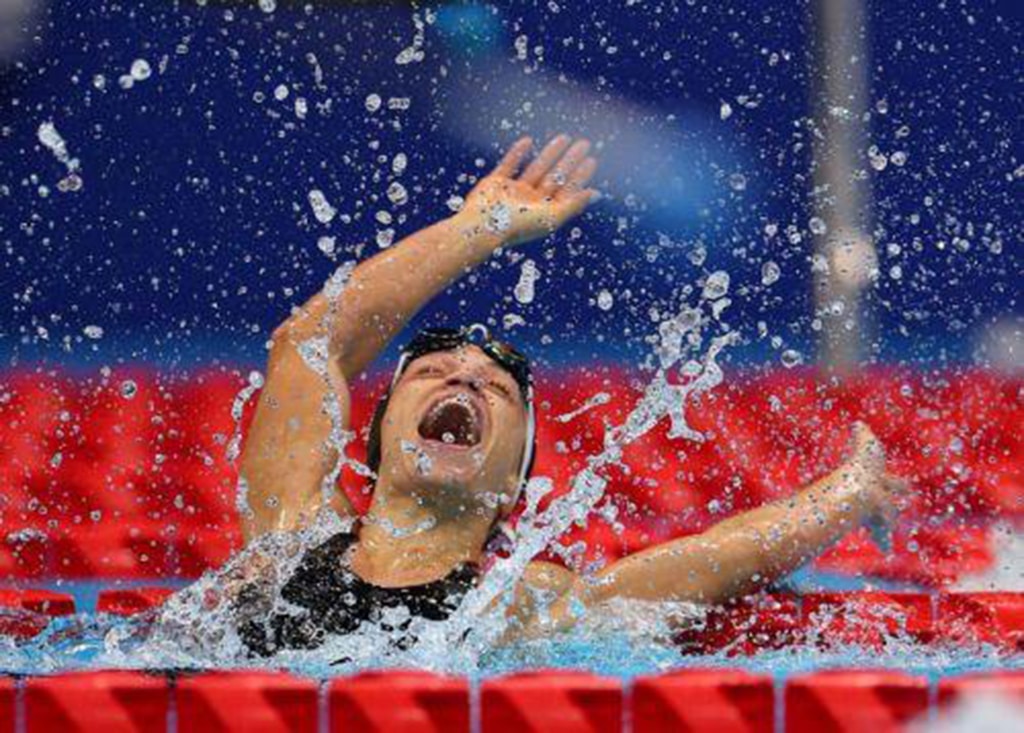
Winning gold in Tokyo
“Problems with my eyesight started when I was nine years old,” she reveals. “We travelled abroad to do tests because doctors in Cyprus couldn’t give us a final diagnosis about what was going on, and why this problem suddenly appeared. I did a lumbar puncture for further examinations and the doctors there advised me to swim to relieve the pain,” she adds. “So my first contact with swimming was in London. I would spend endless hours in the swimming pool, I loved water.”
Upon her return to the island, Karolina began to take swimming more seriously, while also carrying on with gymnastics as well. “In time, I started getting distinctions in swimming and I had to make the decision of keeping up a singular sport; I chose swimming”.
Praising her parents for allowing her to make her own life determining decision at the age of nine, Karolina highlights the support the sport offered her; notably helping her persevere through the difficulties she was facing. “Swimming relieved me physically, but the fact that I got into sports, and swimming in particular, was a kind of balance in my life, most of all psychologically,” says Karolina. “At such a young age, I had to deal with a very serious problem. I certainly didn’t have the maturity to understand what was going on, nor evaluate it, or accept it, so I began feeling disadvantaged.
“At the same time, sport gave me confidence and where I felt I was in a space where I could be good at something regardless of whether I was dealing with a problem with my eyesight,” she adds.
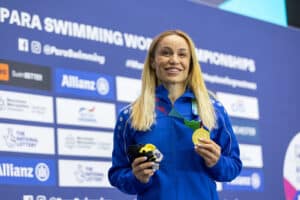
With her gold medal at the world para swimming championship in Manchester earlier this year
“As the problem got worse and I was growing up it was as if I was walking on two boats; on the one hand were school and society that made me feel very bad about everything, and on the other was my time doing sports that made me feel stronger; that I didn’t need someone next to me all the time, or need to ask for help, it was just me and the result was in my own hands.”
In hindsight Karolina surmises that sport was a stepping stone towards the next stage of her life, a transitory stage as she calls it, developing beyond the healthy child that had to accept all the new parametres and find the means to carry on. “My daily life was changing, everything that I could do was changing, my relationships with people were changing, and I was internally trying to find a balance so that I could enter the world again, to assemble myself and be a new person,” she explains.
Karolina found her biggest challenge was finding acceptance as a disabled person in Cypriot society, a cause she has advocated for over the years. “I was trying to accept my new identity but I could see there wasn’t any acceptance from society,” says Karolina. “In 1996, Cyprus was a very closed society; a person with a disability was singled out,” she recalls, “nowadays, we use the term disabled person, but at the time people couldn’t even say it, never mind accept it, and when society is like that, whatever you do, whatever your family does to support you, it’s extremely difficult.
“When I was at school, there wasn’t as much help as you can find nowadays, today you have technology, audio books, people now have awareness and have changed their frame of mind in all aspects of society not just disabilities, but also with regards to gender, diversity, equality, religion and so on, all this is being promoted. Things were very tough for me as a nine-year-old, I was living through hell every day.”
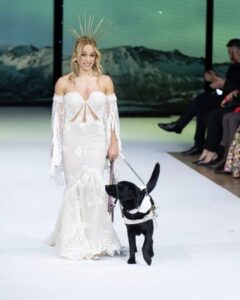
Participating in the Yes I Do Catwalk, at MEC Paianias, with her dog Liberty
Given the circumstances at the time, what gave her the strength to persevere and become the champion she is today; not just as a Paralympian, but a role model and instigator of change?
“I am very independent and autonomous,” she says, “you need to have a little thirst for life to learn and evolve as a character, and I had these traits. Thinking back, I think I thought that if I succeeded and became a champion, I would ‘force’ my surroundings to accept me.
“I’m saying this now that I’m 37 but back then I don’t think I understood what I was doing, but I was doing these extreme efforts with a thirst for success and a competitive nature to force society to accept me for my success. The fact that I was continuously setting more and more goals for myself and seeing that I was evolving was a motivation for me… by the age of 16 I was competing with competent athletes, I was a champion with Pancyprian records and medals in international championships.”
Karolina’s second big decision, after choosing swimming as her sport, was to enter the Paralympic movement. “At the time, Cyprus didn’t know the movement existed,” she reveals. “And I was doing everything I could to hide my problem. I was ashamed, I felt that the less it showed the easier it would be for me to be accepted, and I knew that joining the movement would mean that I was admitting my problem to my friends, to school, to everyone, and I felt the fear that they would say I was different from them, that they would reject me”.
Having decided to lead by example, Karolina can nowadays see the movement developing. “More children are joining, small steps are being made towards the integration of people with disabilities into Cypriot society, and I feel a huge satisfaction. This is one of my biggest wins, beyond medals; medals are certainly important for me, but knowing that you have helped an entire society change its mindset and perceptions around such an important matter is great and I will continue to fight for this until Cyprus is at the standard it has to be.”
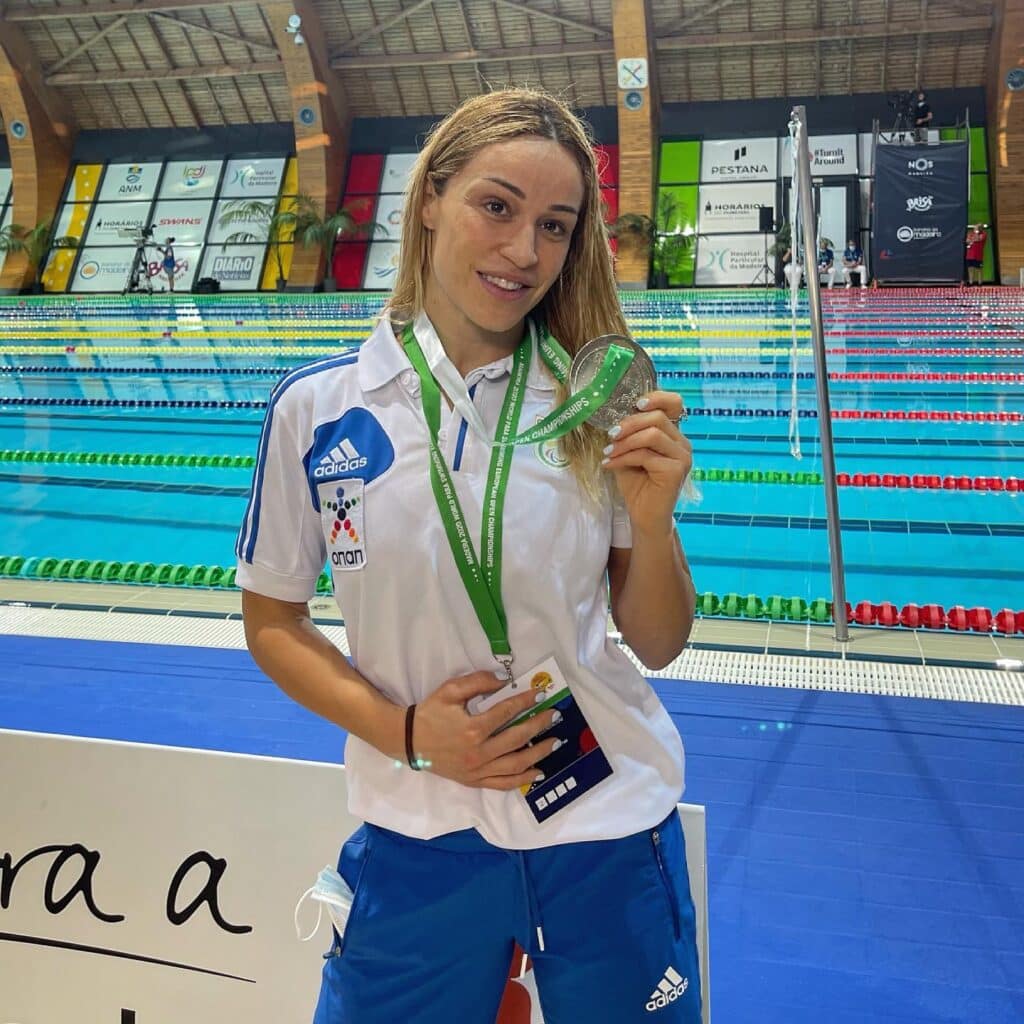
Holding her silver medal from the IPC European Championship in Madeira in 2021
As she continues to compete in high stakes international competitions she looks back on her stand out memories. “In 2002, when I found myself at the Swimming World Championships in Argentina, it was my first participation as a Paralympian and I got the silver medal. I remember myself as an observer… I still hadn’t accepted that I belonged to this whole… I was in shock because it was the first time I saw incredible disabilities that I hadn’t seen up until then and even nowadays, to a great extent, still don’t see here in Cyprus. As they competed, I saw them take part with such joy and dignity”.
Another cherished moment was her return to Cyprus after the 2004 Paralympic Games in Athens, where she won her first gold medal. “It was a very intense experience and when I returned to Cyprus, the whole of Cyprus experienced it with me, I felt a huge joy and pride that I had entered the Paralympic Movement at the age of 16, and that I brought such a huge success to Cyprus and myself. When I started, there wasn’t the slightest thought that in 2024 I would still be competing at such a high level and winning medals, I don’t have words to express the path I followed from 2000 up until today,” says Karolina.
It is obviously a journey that she hasn’t taken alone and she speaks of OPAP, one of her major sponsors, more in terms of a second family than a backer. “OPAP’s support was very important for me… at the level I’m competing, the support of sponsors plays a determining role in results because we’re from a small country. I’m competing with superpowers and countries that have great financial support for their athletes, so for me to be able to find myself at this level, a lot of money is obviously needed. OPAP supported me from my first steps and believed in me and for an athlete, it’s very important to feel that a company believes in them, stands by them and supports them. For me, they functioned as a family, it was never a typical sponsor-athlete relationship.”

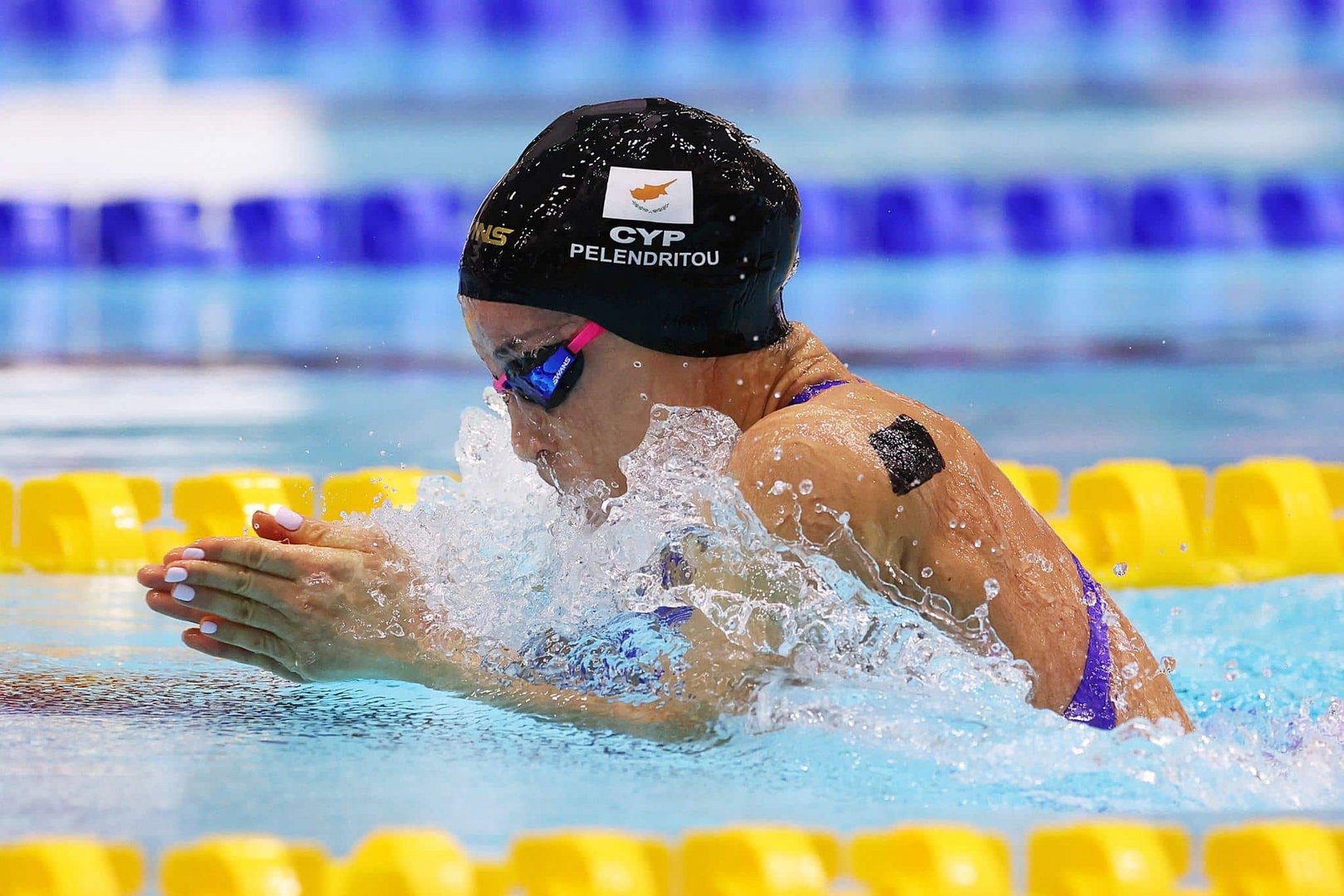
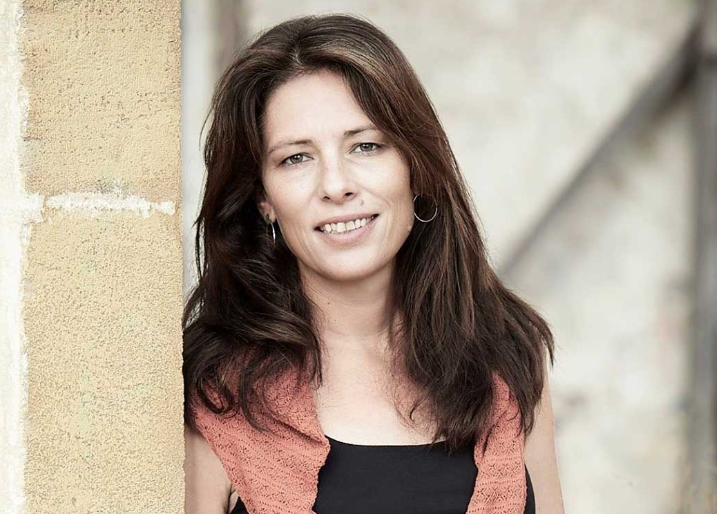




Click here to change your cookie preferences